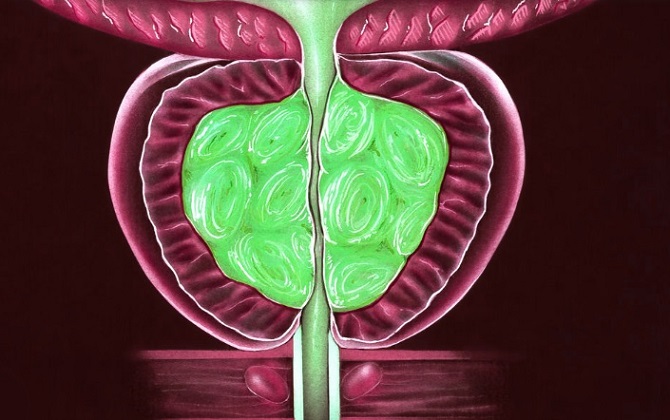Researchers from China Explore the Connection Between Prostatic Diseases and COVID-19
Nikhil Prasad Fact checked by:Thailand Medical News Team Jan 19, 2025 1 year, 2 weeks, 3 days, 13 hours, 23 minutes ago
Medical News: The global COVID-19 pandemic has reshaped our understanding of health, sparking widespread research into how pre-existing conditions affect the severity of the virus. Prostatic diseases - including benign prostatic hyperplasia (BPH), prostatitis, and prostate cancer - are among the most common conditions in men, especially as they age. A recent study led by researchers from Anhui Medical University and Nantong University in China explored the intricate relationship between these conditions and COVID-19. This
Medical News report unpacks the findings of their groundbreaking research.
 Researchers from China Explore the Connection Between Prostatic Diseases and COVID-19
The Research Methodology
Researchers from China Explore the Connection Between Prostatic Diseases and COVID-19
The Research Methodology
To explore this relationship, the researchers employed Mendelian randomization (MR), a robust statistical approach that uses genetic variants to determine causal relationships. By analyzing data from large-scale genome-wide association studies (GWAS), they aimed to establish whether prostatic diseases influence susceptibility to COVID-19, hospitalization rates, or severity of the disease. This study utilized data from over 2.5 million individuals, representing the largest scale of its kind for examining prostatic diseases in the context of COVID-19.
Key Findings: Prostatitis and COVID-19
The study’s results highlighted that while prostate cancer and BPH were not linked to an increased risk of severe COVID-19 outcomes, prostatitis emerged as an independent risk factor for SARS-CoV-2 infection. Men with genetically predisposed prostatitis showed an 11% higher likelihood of contracting the virus. However, prostatitis did not appear to exacerbate the severity of COVID-19 or increase hospitalization rates.
The researchers delved deeper into immune and metabolic characteristics to understand why prostatitis heightened susceptibility to SARS-CoV-2. They identified immune imbalances, such as disruptions in T cell subpopulations, and metabolic alterations in lipid and amino acid pathways as key mediators.
Immune and Metabolic Insights
Immunomics and metabolomics played a central role in unraveling the complexities of this relationship. The study revealed that:
-Immune Dysregulation: Regulatory T cells (Tregs) were found to have a dual role. While some subtypes, like CD28+ CD45RA- CD8dim Tregs, appeared protective against COVID-19, others, such as CD39+ Tregs, were associated with higher risks. PDL-1 expression on monocytes was identified as a partial mediator, with a 9.2% contribution to the increased risk of SARS-CoV-2 infection in prostatitis patients.
-Metabolic Alterations: Specific lipids and amino acids were implicated in susceptibility to the virus. For instance, elevated levels of linoleate and alpha-linolenate increased the risk, while docosapentaenoate was protective. These findings suggest that prostatitis-induced metabolic changes could impact immune responses to viral infections.
;
Understanding the Clinical Implications
The findings carry significant implications for men with prostatitis, particularly younger and middle-aged individuals who form the demographic most affected by this condition. While prostatitis does not worsen COVID-19 severity, its role as a risk factor for infection warrants preventive measures, including heightened vigilance and early testing for SARS-CoV-2.
For healthcare providers, these results underscore the importance of addressing systemic immune and metabolic disturbances in managing prostatitis. Furthermore, the study highlights the potential of targeting PDL-1 pathways and metabolic imbalances as therapeutic strategies to mitigate COVID-19 risk.
Study Limitations and Future Directions
The study’s findings are groundbreaking, but they come with limitations. The data primarily represent individuals of European ancestry, which may restrict the generalizability of the results. Additionally, while the use of large GWAS datasets strengthened the study, some findings did not survive stringent multiple testing corrections. Future research should focus on diverse populations and investigate the long-term implications of prostatitis on COVID-19 and other viral infections.
Conclusion
This study sheds light on the nuanced interplay between prostatic diseases and COVID-19, with prostatitis emerging as a notable risk factor for SARS-CoV-2 infection. The insights into immune and metabolic alterations provide a foundation for future research and potential therapeutic interventions. By prioritizing systemic health alongside localized urological management, healthcare providers can better safeguard patients against the challenges posed by infectious diseases.
The study findings were published in the peer-reviewed journal: Prostate International.
https://www.sciencedirect.com/science/article/pii/S2287888224000540
For the latest COVID-19 News, keep on logging to Thailand
Medical News.
Read Also:
https://www.thailandmedical.news/news/malaysian-researchers-warn-that-covid-19-can-cause-prostatitis
https://www.thailandmedical.news/news/medical-news-singapore-doctors-warn-that-acute-covid-19-infections-can-cause-elevated-psa-levels,-complicating-prostate-cancer-diagnosis
https://www.thailandmedical.news/news/hong-kong-study-finds-that-benign-prostatic-hyperplasia-patients-suffer-from-up-to-five-times-the-risk-of-urological-complications-after-covid-19
https://www.thailandmedical.news/news/breaking-covid-19-news-largest-male-study-to-date-reveals-that-sars-cov-2-deteriorates-prostate-and-urological-health
https://www.thailandmedical.news/news/covid-19-news-warning-for-males-as-sars-cov-2-is-able-to-cause-both-inflammation-and-damage-to-prostate-tissues
https://www.thailandmedical.news/news/covid-19-latest-mount-sinai-urologists-advocate-that-men-with-prostate-cancer-be-screened-for-covid-19-routinely-due-to-severity-and-mortality-risk
https://www.thailandmedical.news/articles/coronavirus
